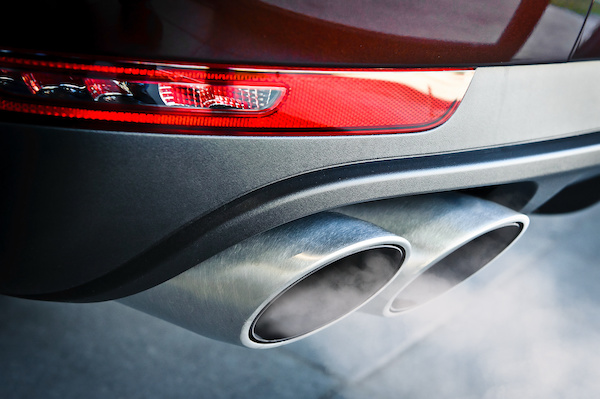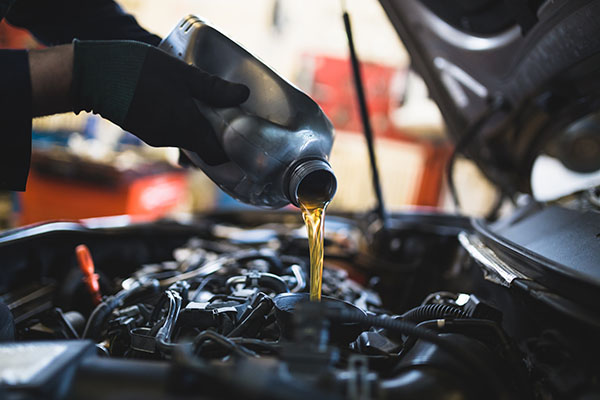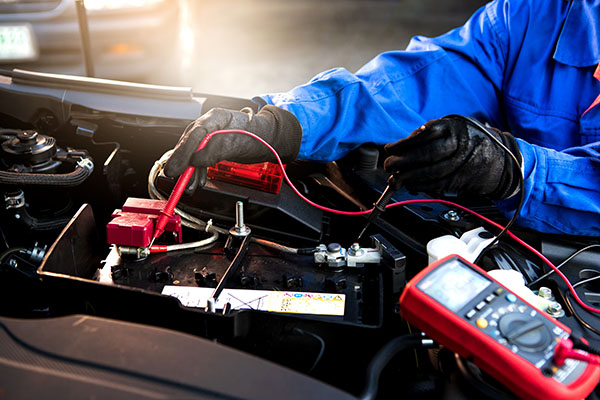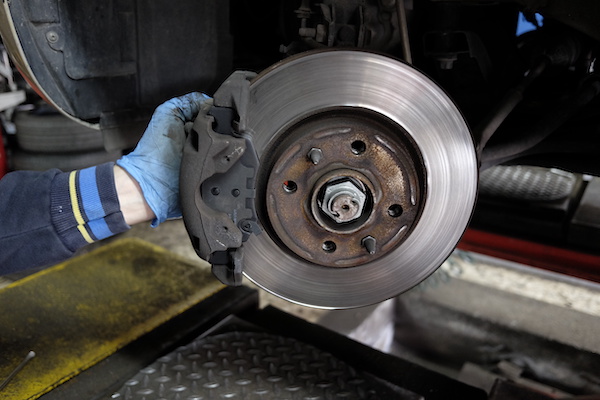Posted on 12/24/2023
.jpeg)
Have you ever wondered how your car's air conditioning and heating system works? Let's take a journey to explore how this magical system works, so you can understand the mechanics behind creating a cozy haven inside your car no matter what the temperature is outside. The Prelude: A Balancing Act Your car's climate control system is like a balancing act, where it's important to maintain a comfortable temperature inside the car. There are two main systems responsible for this - the air conditioning (A/C) and heating systems. They work together to keep you feeling just right, whether it's hot or cold outside. 1. A/C System The A/C system's primary responsibility is to keep things cool when the temperature rises. It achieves this by a process of refrigeration - compression and expansion of a refrigerant. As the refrigerant circulates thro ... read more
Posted on 11/30/2023
.jpeg)
Ensuring optimal braking performance is paramount for every vehicle owner, and the type of brake pads you choose plays a pivotal role in achieving this goal. Today's article will focus on the distinct varieties of brake pads available in the market, providing you with the insights needed to make an informed decision based on your driving requirements. Ceramic Brake Pads Composition Crafted from a dense ceramic compound with embedded copper fibers or other proprietary materials. Performance Ceramic brake pads are renowned for their exceptional heat dissipation, resulting in consistent performance even under strenuous conditions. This type excels in producing minimal noise and dust, making them an optimal choice for luxury vehicles and those seeking a refined driving experience. Semi-Metallic Brake Pads Composition Formulated with a blend of metal fibers—commonly copper, iron, and steel—alongside friction modifiers ... read more
Posted on 10/31/2023

This article is all about luxury cars, and the name that comes to mind when we think of sophistication and elegance is Lexus. They are known for their top-notch reliability and opulence. But which is the best sedan that Lexus has ever produced? Let's take a ride through the history of cars and learn about two amazing Lexus sedans. Each one has its unique charm and appeal, catering to different tastes and preferences. Before we start, we are going to give you a short spec list for both, based on the 2022 variants, since the difference with their 2023 counterparts is minimal or none at all. The Lexus ES 300 - A True Classic As we delve into the lower end of the spectrum, the Lexus ES 300 emerges as an emblem of understated elegance and unbridled comfort. Introduced in the early 1990s, this sedan swiftly carved its niche as a symbol of attainable luxury, captivating drivers with its seamless blend of smooth performance and plush interiors. With its ref ... read more
Posted on 9/30/2023

As the miles add up on the odometer, a question starts to nibble at you – should I consider a complete overhaul after a certain mileage? It's a dilemma faced by many car owners, and today, we embark on a journey to unravel the mysteries behind the mileage overhaul conundrum. Necessity or just a myth - continue reading and find out! Mileage Matters, But How Much? Before we dive into the overhaul debate, let's address the elephant in the room: mileage. It's true that as your car accumulates miles, wear and tear becomes inevitable. However, the threshold for when an overhaul becomes necessary is not set in stone. It's a complex decision influenced by various factors. Maintenance Matters Regular maintenance is the key to prolonging your vehicle's life. If you've diligently followed your car's maintenance schedule, it can withstand higher mileage without major issues. Driving Habits How and where you ... read more
Posted on 8/31/2023
Why Are My Vehicle's Lights Flickering - Auto Repair in Downey You're driving along, and suddenly, you notice your vehicle's lights flickering. Whether it's the headlights, interior lights, or dashboard lights, flickering lights can be a cause for concern. Not only is it annoying, but it may also indicate an underlying issue with your vehicle's electrical system. Understanding the reasons behind flickering lights can help you identify the problem early and take appropriate action to prevent potential safety hazards and costly repairs. Here are some of the common causes of flickering lights in vehicles and what you can do to address these issues. Failing Alternator One of the primary culprits behind flickering lights is a failing alternator. The alternator is responsible for charging the battery and providing power to the electrical components in your vehicle while the engine is running. If the alternator starts to fail, it may not provide ... read more
Posted on 8/31/2023

Cars are more than just machines with wheels; they're also mobile chemistry labs on a mission to transform fuel into motion. But in this chemical dance, there's a byproduct: exhaust fumes. These fumes might seem innocuous, but they're anything but. The Dirty Truth About Exhaust Gasses Before we dive into the cleanup act, let's understand why exhaust gasses are the bad actors in the automotive world. Carbon Monoxide (CO): Your car's engine produces carbon monoxide, a colorless, odorless gas that can be deadly in high concentrations. It hinders your body's ability to carry oxygen, leading to dizziness, nausea, and even death. Hydrocarbons (HC): These unburned fuel remnants can react with nitrogen oxides (NOx) and sunlight, forming ground-level ozone, a major component of smog. Ozone can irritate your lungs, exacerbating respiratory problems. Nitrogen Oxides (NOx): NOx emissions contribute to acid rain and ground-level ozone, both of which harm the environment ... read more
Posted on 7/31/2023

As a responsible car owner, you've likely heard that changing your oil when it changes color is crucial for maintaining your vehicle's health. But is this advice always accurate, or is it just a widespread misconception? Today's blog will explore the truth behind this common practice and offer valuable insights to help you make informed decisions about your car's maintenance. Understanding the Oil Change Interval First, let's clarify the standard oil change interval recommended by automotive experts. Modern engines and high-quality engine oils have evolved, enabling longer oil change intervals compared to older vehicles. For many vehicles, the standard oil change interval ranges from 5,000 to 7,500 miles or every six months, depending on driving habits and the type of oil used. Why Does Oil Change Color? Engine oil typically appears amber or light brown when new. As it goes through its cycle, the oil accumulates dirt, car ... read more
Posted on 6/30/2023

Modern vehicles are equipped with complex electrical systems that power various components and control critical functions. When an electrical issue arises, mechanics are tasked with diagnosing and repairing the problem. But how do they know which specific electric component is causing the problem? Well, in today's article, we will take a closer look at exactly that, so keep on reading if you want to find out more! The short answer is a diagnostics tool - most commonly an OBD-II scanner. Mechanics use various diagnostic tools to aid in troubleshooting electrical issues. One of the most common tools is an OBD-II (On-Board Diagnostics) scanner, which connects to the vehicle's computer system. The scanner retrieves error codes that indicate specific problems in various systems and components. These codes serve as a starting point for further investigation. Gathering Information Before delving into the diagnostic process ... read more
Posted on 5/31/2023

Brake rotors just like brake pads are important and crucial to the car's braking system. They need to be replaced as soon as any wearing is noticed. It is important that you know all the indicators of brake rotors in need of changing. We've listed some for you below. Signs of Worn Out Brake Rotors Thin Brake Rotors - The physical thickness of brake rotors says a lot about their wearing. Turn brake rotors must be replaced as soon as possible. Loud Noises When Braking - The noises tend to be caused by corrosion and other worn-out components. This may also be due to the mechanical wear sensor that comes with most brake pads today. It is specifically designed to make audible noises when brake rotors are too thin and in need of replacement. Warped Brake Rotors - Warped brake pads are mostly caused by heat! Too much heat causes the surface of the brake rotors to become uneven and warped. Different brake rotors are created with different purposes the likes of riding on normal ... read more
Posted on 4/21/2023

With Earth Day coming up, many individuals are looking for ways to limit their carbon footprint and help protect the environment. One way to do this is by adopting eco-friendly driving habits. Not only can this help the planet, but it can also save you money on gas and reduce wear and tear on your automobile. Here are some tips to follow for eco-friendly driving: Drive Smarter - One of the most effective ways to reduce your fuel consumption and emissions is to drive smarter. You can improve your fuel efficiency by up to 30% by accelerating and braking gently, avoiding rapid and sudden braking, and maintaining a steady speed. Plan Your Route - Another way to save fuel and limit emissions is to plan your route carefully. Avoid congested routes and rush hour traffic, and plan your trips to avoid unnecessary detours or backtracking. A GPS device or a smartphone app can go a long way in helping you find the most fuel-efficient route. Reduce Your ... read more